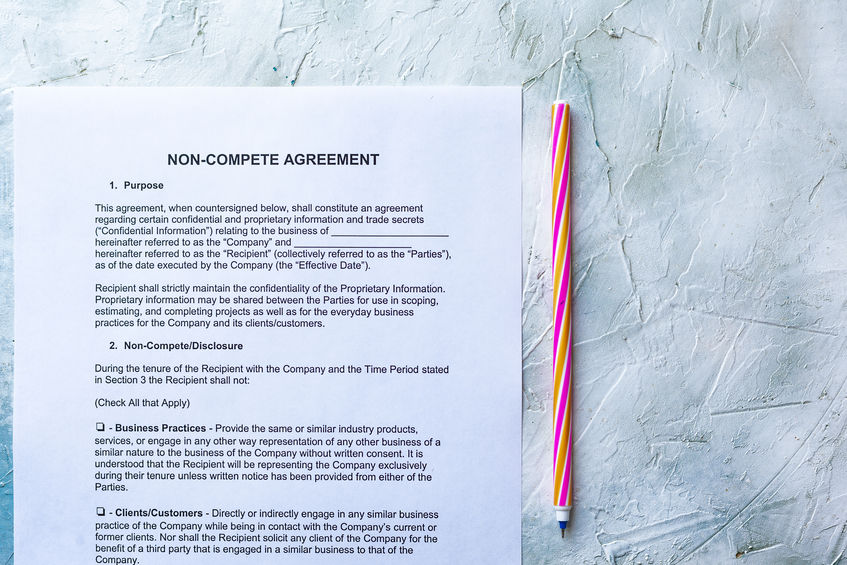If you’re a business owner or have EVER been an employed by a larger or specific field, you’ve probably run into or have a NON-COMPETE agreement. Just like any contract, there are limitations to everything and in case you didn’t know, according to FL Statute 542.335(1)(d)(1), non-compete agreements are enforceable against an independent contractor just like an employee.
Are Non-Competes Enforceable in Florida?
However, the agreement signed may not be legally enforceable for other reasons. Non compete agreements must serve to protect an employer’s “legitimate business interest.” Florida law sets out a nonexclusive list which includes: trade secrets, confidential business or professional information that does not qualify as a trade secret, substantial relationship with specific customers, patients or clients, or customer goodwill associated with an ongoing business, a specific geographical location or marketing area, or extraordinary or specialized training.
- The main question to ask is whether it would be unfair for the employee to use that to benefit his/her new employer.
There are many Florida cases interpreting these various business interests, and what may or may not qualify. For example, courts have stated that the specialized or extraordinary training must be very specific. In other words, just because an employee receives some on-the-job training, such as how a particular company does things, does not necessarily mean that this training would qualify as extraordinary. Say the employee receives just basic training on a computer system, such as word processing or spreadsheets, it is unlikely that the training would qualify for specialized training.
The burden is on the employer to plead and prove existence of these legitimate business interests, and also prove that the restriction sought to be enforced is reasonably necessary to protect those interests.
Non-compete agreements must also be reasonable in time and geographic scope. Florida Statute 542.335(1)(d) provides that a court will presume 6 months or less as reasonable, and more than two years as unreasonable. As for the geographic scope, “reasonable” means the areas in which the employer does most of its business.
In Florida, if a non-compete is unreasonable, the agreement will still be enforceable, but the court might cut back the time or area to which it applies.
Can I Fight Non Compete Clause in Florida Court?
An employee facing a lawsuit on a non-compete may defend by challenging the existence of the business interests claimed by the employer or the reasonableness of the restrictions. Other defenses are available to the employee as well.
A common defense by an employee is a claim of prior breach. That is, that the employer first breached some aspect of the employment agreement, thereby rendering the non-compete provision unenforceable.
- The employer’s failure to pay compensation under a contract of employment is the most common material breach available as a defense to employees who have previously signed a non compete agreement. Florida courts have regularly denied injunctive relief in these situations.
- Benemerito & Flores, M.D.s, P.A. v. Roche, 751 So. 2d 91 (4th DCA 1999)
- Harrison v. Palm Harbor MRI, Inc., 703 So. 2d 1117 (Fla. 2d DCA 1997)
For our case, in order for the non-compete agreement to not be enforced, the employee needs an “out.” We would need more information as to whether the employee had any special training, how long did he work there for before leaving, did he get fired, and did the former employer breach his duty and did not pay him?
How long can a Non Compete Agreement last in Florida?
The non-compete agreement in our case is for two years. Courts have not ruled as to whether that is unreasonable. The FL statute says 6 months or less is reasonable and over 2 years is unreasonable, but the “in between period” is a case-by-case analysis.
A hearing on a temporary injunction usually happens early in the case, within a few weeks or months after the lawsuit is filed. The hearing is essentially a small trial, which could take an hour or a day or more, and is the reason why the litigation fees can be very expensive early on in the case.
Therefore, it is better for a former employer to settle the case then to go to court to seek an injunction because it can be very expensive. If the judge agrees with the employer and grants a temporary injunction prohibiting the employee from working for a particular employer, the employee is out of a job. But because this is a temporary injunction, the employer may be required to post a bond in the case where it is later determined, at a full trial, that the injunction was improper. This can be significant, and employers have been required to post bonds of several hundred thousand dollars after they “win” the injunction hearing.


